[Kampot, 12/31/24]
Born in Tây Ninh, Phalla has no memory of it. Raised in Phnom Penh, her mom disappeared when she was just four-years-old. In broken English, she told me this at Kampot’s Khemra Café, where she’s a barista. To hide this hurt, her face hardened. For three straight days, I’ve gone to Khemra to write. It’s quiet, so perfect.
“She go away. She never come back. I don’t know how she look.”
“So you lived with your father?”
“Yes.”
Sensing she was about to cry, I touched her arm.
“He marry. New wide.”
“How many brothers and sisters do you have?”
“Two. Two brother. My father, he dead. I live with my husband. He dead.”
“How long ago?”
“Fourteen year.”
“A long time ago! How long were you married?”
“Eleven year.”
“Do you have a photo of him?”
She showed me a smiling man in a yellow shirt at a white table. He’s about 32.
“He’s very good looking!”
Phalla smiled, “Many girlfriend.”
“Oh,” so living with him wasn’t entirely pleasant. “How did he die? Was he sick?”
“No. He English teacher. He go home.” Not knowing the word “accident,” Phalla pointed at the road.
“He died in a traffic accident?”
“Yes.”
With her man, Phalla had two kids. Her 22-year-old son now works in Battambang. Like his dad, he’s exceptionally good looking. On holidays, he returns to see his mom, 14-year-old sister and paternal grandparents. They all live together. Phalla showed me a photo of them standing in a bright room with clean walls, high ceiling, tiled floor and a flat screen TV.
“That’s a nice house! You have a nice house!”
Phalla smiled. Everywhere I go, people tell me much. Phalla also showed me photos of her dad’s funeral in Kracheh. She was pleased to hear I had visited that lovely riverine town. Its Phum Café has two angelic kids who cheerfully help their parents set up each morning.
Two soldiers flanked his coffin. Whatever Phalla’s dad left behind must have been seized by the stepmother. I had guessed Phalla’s age as 50, but grief has likely aged her.
Yesterday, I toyed with the idea of going to Kep. Seeing mini buses around Samaki Market, I asked, “Kep?” “No,” two drivers said. As I loitered, a gaunt old man in a plaid shirt leapt in front of me. Gesturing then posing stiffly, he just wanted to have his photos taken. Satisfied, he plopped back onto the sidewalk. He’s not going anywhere, and neither am I, for now.
I’m so glad I stayed. For New Year’s Eve, Ponleu Dara jacked its price from $7 to $20, so I’ve moved to Ratanak, near the Preaek Tuek Chhu River. My $10 room has a window. Low-end guesthouses in Vietnam, Cambodia and Laos usually have an employee or two sleep on cots by the door. Ratanak has three. Going out just after 5AM, I didn’t have the heart to wake any of them, so I stood on plastic chairs to climb over the sternum height wire fence. Within seconds, I felt that elation of being on a Southeast Asian street that’s not overwhelmed by traffic or heat.
I had to walk four blocks, though, to reach a café open that early. I had been there twice. My second time, I found out its owner was Vietnamese. Let’s call him Tài.
At age 23, Tài served as a medic in the invading Vietnamese army. He saw no action, however. Overmatched, the Khmer Rouge fled.
“When I was living in Phú Lâm,” I said, “I’d see this man who had lost both legs and was blind. He fought in Cambodia.”
“There were Chinese mines,” Tài explained. “Since our rations were so poor, guys would pick fruits from trees. Many of them stepped on mines. If you weren’t tempted to do that, you were fine.”
“So there were no Khmer Rouge in this entire area?”
“None. Cambodia had seven million people. We had 80. They just ran.”
“We also had tanks and planes. They had nothing.”
“They were so terrified, they lived in trees. They built these shacks on trees, and stayed there.”
“Like monkeys.”
“No, monkeys would leap from tree to tree. They had to grope and climb.”
“What about the locals? Did they back the Khmer Rouge?”
“Not really.”
“They were so evil. Up north, though, the Khmer Rouge had more support.” I meant the region around Stung Treng.
It’s irrelevant to Tài. He liked Kampot so much, he refused to go home. He learnt Khmer word by word, and performed the most menial tasks to survive. Forty five years later, he has a café, store, bakery and farm. Though very basic, they still rake in bucks. Two sons are doctors. One is a welder. His daughter is married.
His half Chinese, half Vietnamese wife was born in Cambodia. Her parents emigrated here in the 1930’s. Just as the British brought Indians to Africa, the French moved many thousands of Vietnamese into Laos and Cambodia. In both cases, the reason was the same. These immigrants were better workers. There’s a much quoted saying attributed to the French, “Vietnamese plant rice, Cambodians watch rice grow, Laos listen to rice growing.” During my six months in Laos, I often saw Laos waiting an hour each morning to give food to monks. Local Viets were busy running their businesses.
Industry isn’t necessarily good. Norman Lewis in 1951, “The Vietnamese, whose Buddhism is diluted almost to the point of non-existence, has a competitive soul, is a respecter of work for its own sake, and strives to increase and multiply. As he will work hard for himself, he can be made to work hard for others, and is therefore the prey of the exploiter.”
Tài’s daughter-in-law is also Vietnamese. Technically here as a tourist, she pays local cops $30 a month, a great deal. Two of the three men at our table were also Vietnamese. Told this after they had left, I said, “I had no idea! Why didn’t they join our conversation?”
“Vietnamese here try not to speak Vietnamese. Cambodians don’t like it.”
Makes perfect sense. Viets in Vietnam don’t like to hear Chinese.
Born in Bến Tre in 1955, Tài learnt as a child that sometimes you must hide your identity or intentions. Though just 43 miles from Saigon, his village was swarming with Viet Cong. Since young men were still drafted into the South Vietnamese Army, there were instances of brothers literally killing each other.
“What are you going to do?” Tài said. “You had no idea what you were shooting at.”
Sometimes ARVN officers were forced to shelter Viet Cong inside their own homes. Saigon weapons and supplies were also diverted or sold to the Communists. Though always reduced to cartoons, war is more complicated and contradictory than you can imagine.
Having spent nearly two years in Vung Tau, I’ve become familiar with its geography. The mangrove forest in nearby Cần Giờ was ideal for the Viet Cong. Tài, “American planes couldn’t spot them. If a helicopter went too low, it would be shot at. These guys wore nylon shorts. They were easy to dry and didn’t get moldy.” These guerillas never bothered the thousands of Americans, Aussies and South Koreans in Vung Tau. It’s a slight variation on Wee Willie Keeler’s “Hit them where they ain’t.” Hit them where they ain’t many.
Most enlightening was Tai’s take on women, “She should have a wide hip and narrow waist. With a wide enough hip, you don’t even need to go to the hospital. The baby will just pop out.” To illustrate, Tài waved his hands near his crotch. “And she can’t be flat chested. She must have milk for her babies.”
Believe it or not, breasts are functional and not toys. Tài, “Us men shouldn’t pay them too much attention. This ruins breasts as women age. Focus below.” As for Cambodian ones, “They’re like melons. They sag.” It’s prompted by my remark on the beauty of Cambodian women.
New Year over, the rate at Ratanak Thmey is reduced to $7.50. I just paid for one more night. Tomorrow morning, I will go with Tài to check out his cows and pigs. I should visit Phalla again. For lunch, I will pop into Aroma. A true gem, it’s owned by an Iranian American, James, who’s been in Kampot a decade. Wait until you hear about this fascinating gentleman. The humus, tahini and falafels I had at his place this afternoon salved my soul.
I finish this at Snam Sneh Snamut Café. A boy of four in a Spiderman shirt keeps trying to figure out what I’m doing. It’s possible he has never seen anyone write anything. That old yellow dog is no longer enraged by my presence. Just now, he came within inches of my right foot.
Though my visa hasn’t arrived, I caught a mistake in the application, so was able to correct it. It’s dark and peaceful in Kampot. You, too, should be so lucky.
[Kampot, 12/31/24]
[Kampot, 1/1/25]
[Kampot, 1/1/25]
[Kampot, 12/31/24]
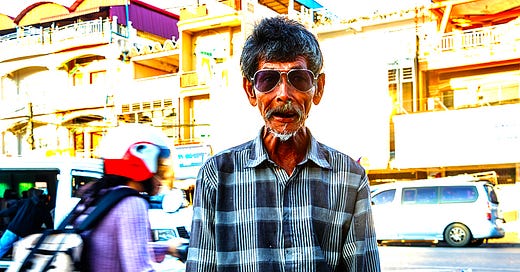



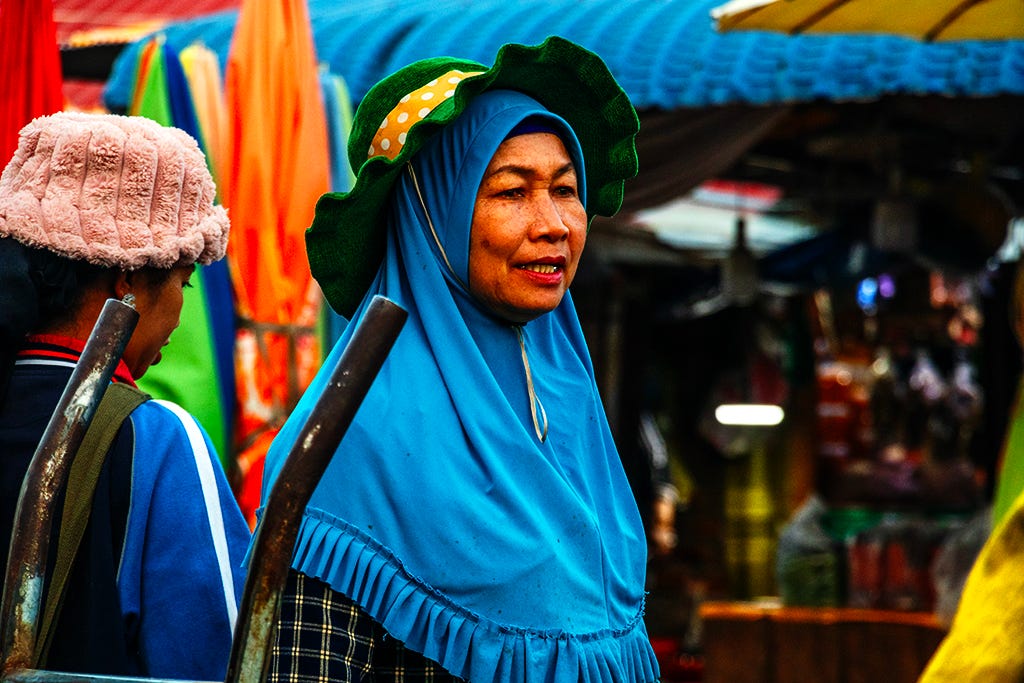
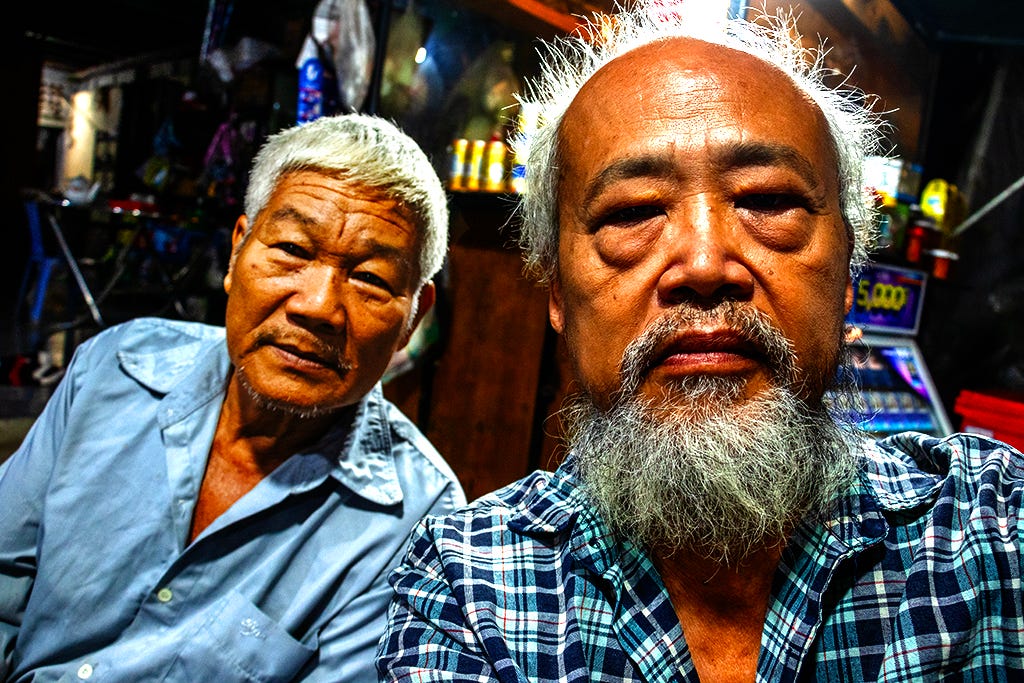
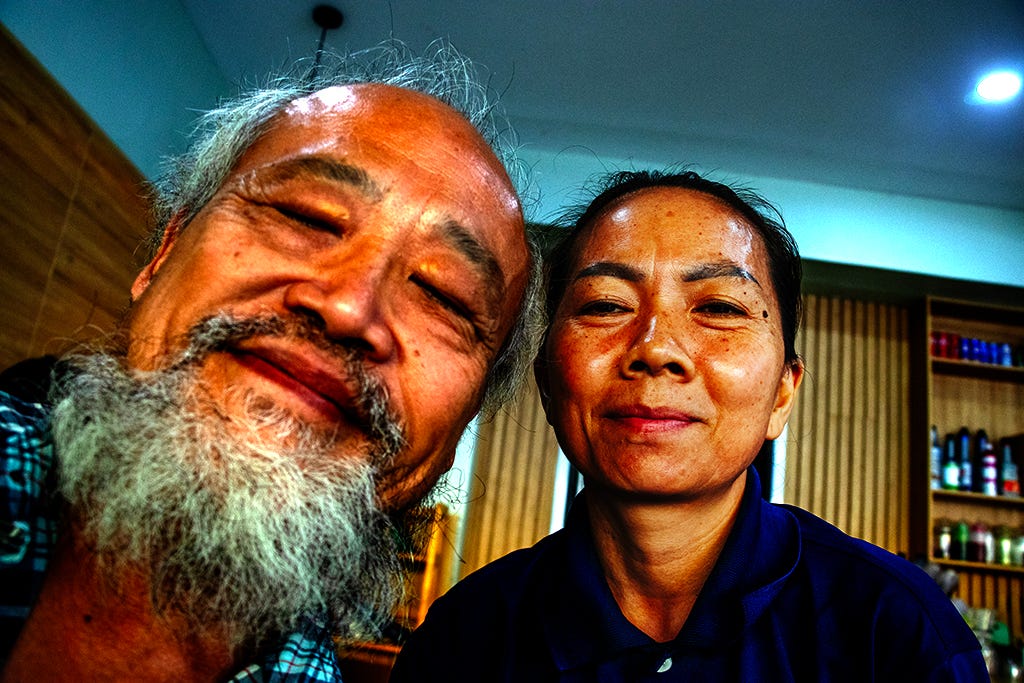
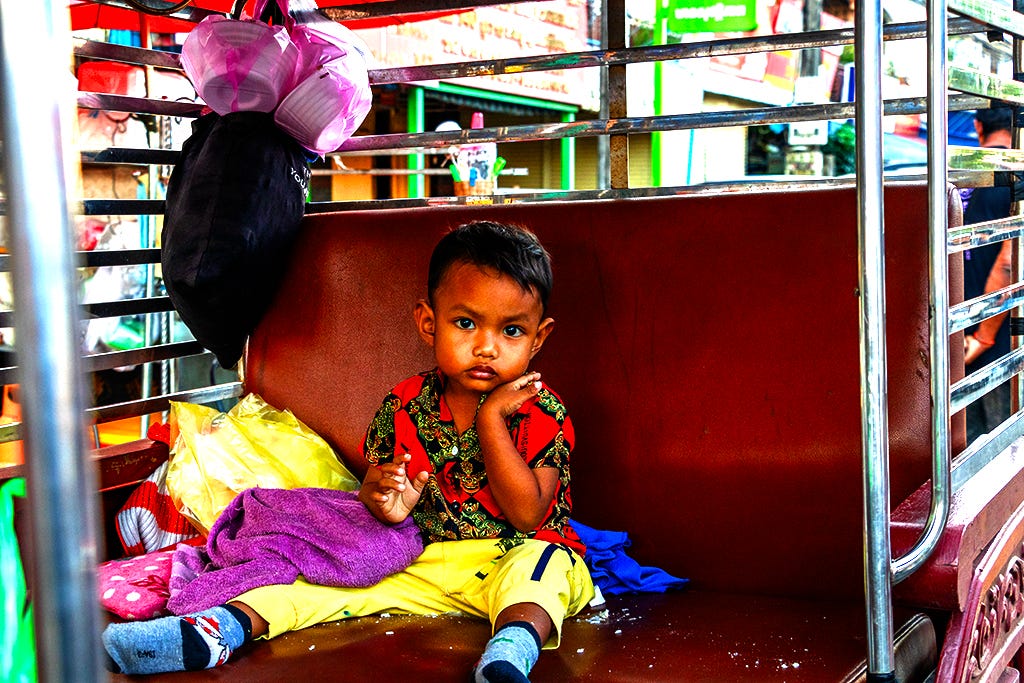
happy New Year, smiling Linh!
"It’s possible he has never seen anyone write anything." As a storyteller you can sure spin a yarn Linh. As I contemplate the possibilities of that statement I realized that there are many similar American kids now inclusive to that thought. The structural bricks of America are crumbling, no more readin',ritin' and 'rithmetic. I see real depth and life in almost every person's eyes that you photograph, compared to vacant 'Murican stares. Good luck with your visa and thank you for taking us along...